Reports
Young Biologist Forum 2024
On Saturday 16th March, Royal Holloway University of London hosted on its beautiful campus the 3rd edition of the Young Biologist Forum. The event is fully organised by the RHUL Biological Society students and supported by the Royal Society of Biology Thames Valley branch. The Young Biologist Forum is traditionally a career themed event, unique in its informal structure which fosters discussion and effective networking and the success of this event is based on two main pillars; empowering students and creating flexibility of choice.
The partnerships with Royal Holloway University started during the COVID-19 pandemic and marked the RSB Thames Valley branch’s return to in-person events. Since then, the event has been a great success, drawing the record attendance for a careers-focused event at RHUL, also involving students from different universities and further education schools. This year's most represented sectors were artificial intelligence and machine learning, sustainability and the health sector, with participation of local organisations with interests in environment and development of new technology.
Reflecting on the third edition of the YBF, it was an absolute pleasure to see students standing up to the challenge once again, for their work and engagement, designing and organising an event that fulfils their interests in regards to the job market, and ultimately their future. Thank you to Ruby Tomlinson, Henry Haywood-Smith, Arianna Pizzo, Eva-Mae Hart, Zeyba Farroqi, Amber Bulley and Molly Brown.
We also acknowledge all the members of the RSB Thames Valley branch for their support and in particular Professor Ian Hunneyball, who also took part in the event and provided his professional expertise.
We now look forward to the 4th edition, excited to witness again the vision and creativity of the biological society students and with the intent to strengthening event more the partnership between Royal Holloway University and the RSB and also growing the participation of other local institutions.

Dr Walter Lucchesi MRSB
Young Biologist Forum 2023
18 February 2023
On Saturday 18th February 2023, Royal Holloway's Biological Sciences Society (RHUL BioSoc) hosted a full-day networking and careers event, in partnership with the Royal Society of Biology. This event welcomed over 100 attendees representing more than a dozen institutions. There were 10 speakers, split across a multitude of molecular and organismal occupations who all shared their invaluable experience in seminar-style talks covering the multifaceted aspects of their jobs such as the possible pathways, lifestyle, skills and traits, and more!
The speakers provided fascinating talks and covered: veterinary medicine and TV work (Scott Miller); becoming a medical geneticist (Mariam Ibragim); what a conservation coordinator is ( Backy Ive, Hawk Conservancy Trust); how to enter developmental science (Sophie Barrett, Allergy Therapeutics); what working as COO of an international NGO entails (Juan Castaños Vilas, Plastic Oceans); the life of a doctor (Pedra Rabiee, NHS); creative production and engagement (Khalil Thirlaway, NHM); what marketing managers do (James Toman, HCA Healthcare UK); how to survive being a secondary school biology teacher (Graham Hartland) and how to become a senior brand manager (Sresha Banerjee, Eli, Lily & Co).
The day culminated in an inspired atmosphere with immensely positive feedback and students eager to embark on their newfound career options. This collaboration resulted in a successful and interactive event that prompted many questions, discussions and opportunities. Students and speakers alike left with new connections and views, enjoying the return to a bustling in-person event.
It has been an honour and a joy to organise this event two years in a row, with the help of Walter Lucchesi from RHUL, Ian Hunneyball and Ken Allen from the RSB, alongside the RHUL BioSoc committee, without whom it would be an impossible task. These fantastic people created a wonderful, dynamic team, paving future opportunities for similar collaborative events between the RSB and RHUL.
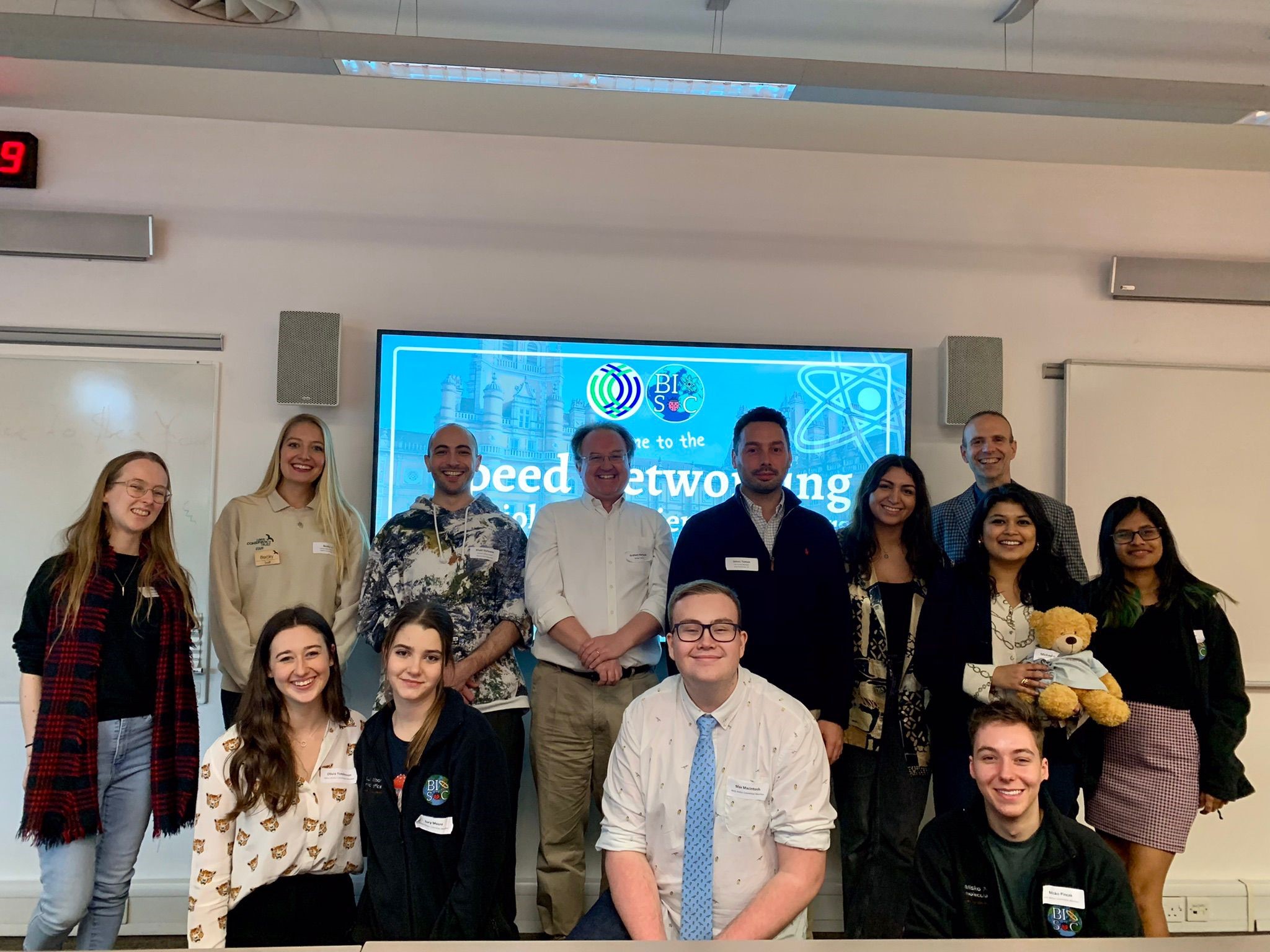
Speakers and RHUL BioSoc Committee: Back L – R: Sophie Barrett, Becky Ive, Khalil Thirlaway, Graham Hartland, James Toman, Pedra Rabiee, Walter Lucchesi. Front L – R: Olivia Tomlinson, Lucy Moore, Max Macintosh, Misko Pincak, Sresha Banerjee, Mayuree Kumkar
Olivia Rose Tomlinson AMRSB, RHUL BioSoc President
Crocodiles of the World Tour
8 June 2022
Colin Stephenson gave 14 members from the Thames Valley branch of the Royal Society of Biology a private and unique tour of Crocodiles of the World, based near Witney, Oxfordshire. The UK's only crocodile zoo was founded in 2011, and houses over 150 crocodiles of 24 different species We received much information about the breeding, lifestyle and conservation of the animals that are located at the zoo. Many of these species are on the International Union for Conservation of Nature (IUCN) red list so conservation projects like these are incredibly important for endangered species and protecting biodiversity. The zoo has a significant role nationally and internationally in crocodile research and conservation.
The tour started with observations and discussions about the difference between crocodiles and alligators, and then we saw them up close! First, we saw Schneider's dwarf caiman, and the Cuvier's dwarf caiman. We then moved to the American alligators and the tour ended in the crocodile house, which houses Saltwater, Nile Siamese, Cuban and Tomistoma crocodiles. It was amazing to see the animal's adaptations and learn about their habitats, metabolism and diets up close.
The zoo also houses Giant Galapagos tortoises as well as turtles, a Fishing Cat and a Komodo Dragon, Meerkats and Tamarins, and other reptiles ( monitor lizards, iguana and snakes)
Colin, who holds the role of Head of Educations, was an excellent host. He has so much knowledge to share and was able to answer all our questions with his experience and many stories to share. A huge thank you to him, and to Crocodiles of the World for hosting us for our first in-person event since the start of the COVID-19 pandemic.
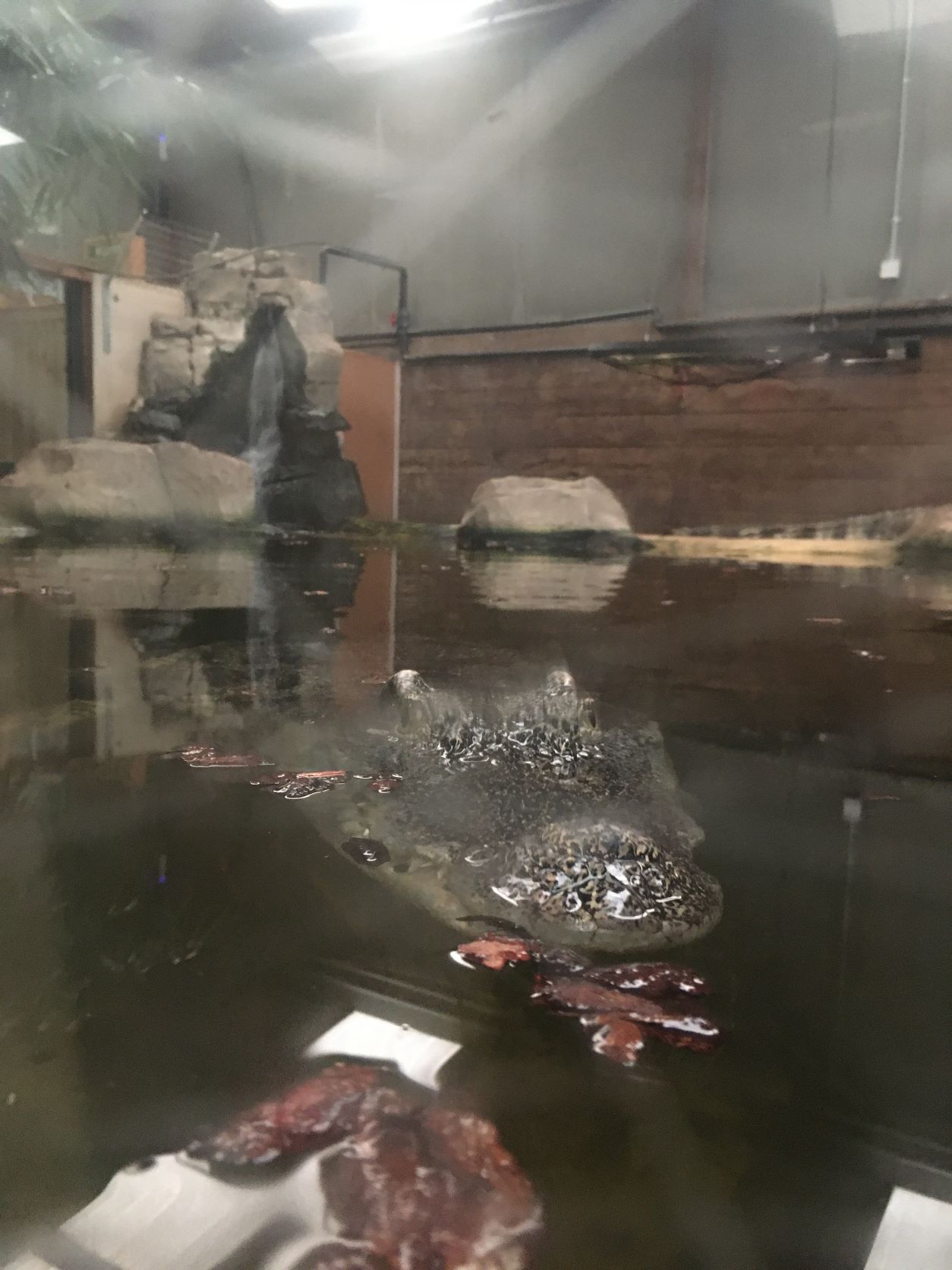
Kerry Broom CBiol FRSB
Young Biologist Forum 2022
19 February 2022
The Young Biologists Forum was hosted by Royal Holloway University of London for the first time. This marked an important milestone for both RSB and RHUL as it was RSB’s second face to face event since the COVID-19 pandemic began. The full day conference was organised by the Biological Sciences Society at RHUL, together with the Royal Society of Biology Thames Valley branch.
It was a very successful and interactive day of seminars and networking, focusing on careers and student interaction with peers and employers. The meeting was delivered in a hybrid mode and open to all universities in the Thames Valley region and further afield. Notable mentions to Exeter, Cambridge University, and Università Statale di Milano (Italy).
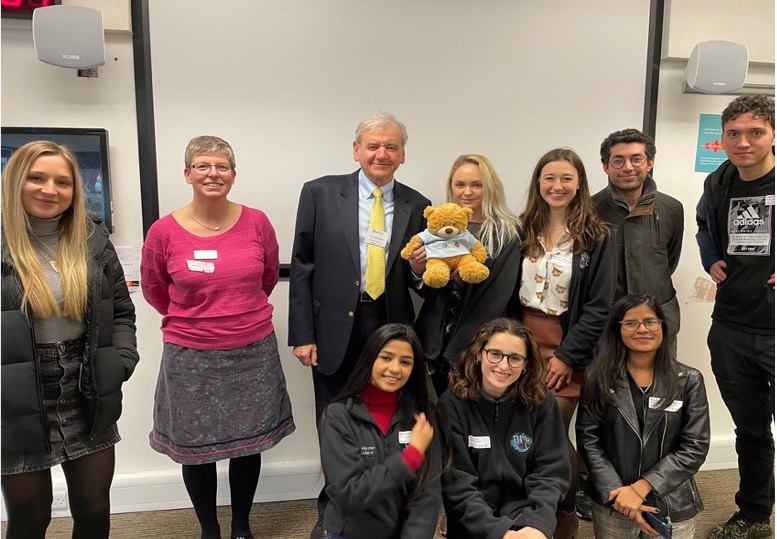
Left to right - Back Row: Isobel Frey, Kerry Broom, Ian Hunneyball, Melanie Gelderd, Olivia Tomlinson, Rohit Bangay, Martin Zilli Front Row: Rida Haider, Marta Cortesi, Mayuree Kumkar
The speakers delivered exciting and informative talks covering aspects of their lifestyle, development of skills, professional progression and beyond; amongst the speakers were Patrick Hurley (junior doctor in Cambridge), Negin Hashemi (regulatory affairs project manager at GSK), Harvey Bhandal (senior territory manager at Bioventus), Jola Kopec (protein crystallographer at Evotec), Kerry Broom (from UK Health Security Agency), Rohit Bangay (MSc on insect interaction), Isobel Frey (field ecologist), Olive Tonkin (production management Assistant at BBC).
The seminars were followed by a networking session with speakers and students. This aspect in particular was extremely useful for the students, fun for the speakers and provided a previously lacking opportunity to create life lasting personal connections.
We cannot wait to be given other opportunities like this with the possibility to host similar events in the future at Royal Holloway University.
Dr Walter Lucchesi MRSB, Olivia Tomlinson, Melanie Gelderd, Marta Cortesi, RHUL BioSoc Committee
Lecture by Keri Langridge on Scottish Wildcats' Hybridisation
09 November 2020
This was our first joint meeting with the Oxfordshire Mammal Group which was held online. Keri Langridge discussed the history and decline of Scottish wildcats. A description of the appearance and distinguishing features of the cats and hybrids were given, such as the dorsal line on the back and the tail markings.
She talked about the reasons for the decline, such as habitat and predator decline. She discussed the recent interbreeding and hybridisation of the wild cats with domestic cats.
The second part of her talk focused on the drivers of hybridisation and whether it was cause or effect. She noted that hybridisation is the key threat but it is not known whether this is the cause of extinction or a consequence of population decline. She went through some international case studies covering different aspects of hybridisation. Her first case study looked at Germany where there is low hybridisation mainly thought to be because humans do not live near the forest.
In Spain there are differences between the male and female wild cats, and there is higher hybridisation because of wider movement range and their habitat is used for hunting etc. Drivers for population decline include loss of prey and habitat, non-natural mortality.
She ended the talk discussing the future strategies for conservation and stated they must address the underlying causes of hybridisation, which can be a consequence of population decline caused by different anthropogenic factors.
Wildcats like large areas of continuous deciduous habitats, with no disturbance. Habitat management can play a role in reducing or preventing hybridisation as well as management of the domestic cat population.
We valued Keri’s talk and found it very informative. We are hoping that the joint links with the Oxfordshire Mammal Group will continue.
Kerry Broom CBiol FRSB
Young Biologist Forum 2019
12 February 2019
Our third annual careers event was hosted at the University of Reading and was perhaps the most successful yet! Speakers attended from a range of organisations including Ian Hunneyball, senior vice president at Evotec, Nathan Cowieson, a beamline scientist at Diamond Light Source and Jassent Owens from NHS Pathology.
They all gave engaging talks to A level biology students and undergraduates about their day-to-day role and their individual career routes, including the life of a PhD student.
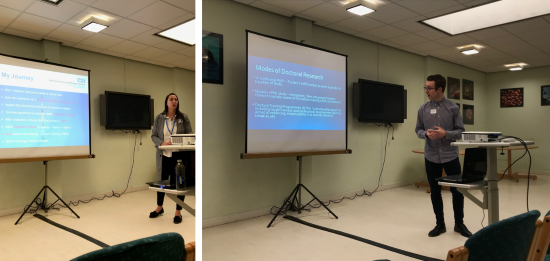
Photo credit: Leah Napier. Left: Talk by Jassent Owens from NHS Pathology. Right: Talk by Ryan Morris on life as a PhD student.
There was a great turnout of students from the Reading and Oxford areas, who found the talks motivating and were very keen to ask questions. All day alongside the talks, students were invited to talk to employers at their stalls, as well as enjoy networking at the free morning coffee and lunch provided.
Dr Ray Gibson CBiol FRSB and Dr John Grainger CBiol FRSB, members of the Thames Valley branch committee, also gave talks on their own careers, the university itself and the benefits of being an RSB member.
Overall the event was a huge benefit to the students that attended, and it was a great pleasure to have organised such an event for my peers. Their interactions with a range of experts helped guide their paths after university, as well as help the RSB gain more student members.
If you are a member of the Thames Valley branch and would like to get involved with the event in future, please get in touch!
Leah Napier (Affiliate Student)
Young Biologist Forum 2018
31 January 2018
The second Young Biologist Forum (YBF), a collaborative project between students at the University of Reading and the Thames Valley branch of the RSB, took in January. This careers and networking event catered for students interested in biology and its resounding success relied on the variety of speakers who gave up their time to speak to an audience which, this year, included sixth formers, undergraduates and postgraduates from Reading and elsewhere.
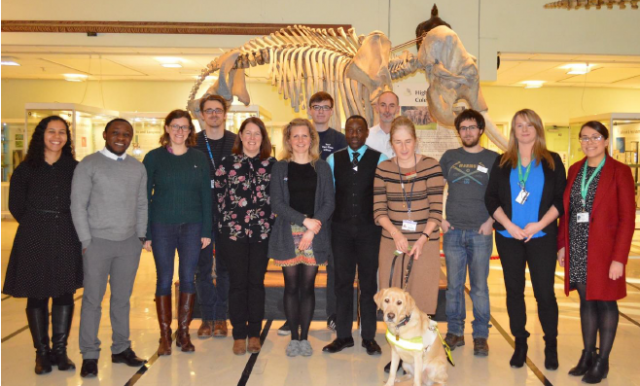
Speakers and organisers of the 2018 Young Biologist Forum
We were lucky enough to feature speakers from the Galapagos Conservation Trust, BSG Ecology, Syngenta, Neem Biotech, the European Medical Writers Association, the Centre for Ecology & Hydrology, the Institute of Cancer Research, Sagittarius IP, the Defence Science and Technology Laboratory, and Lonza.
Additionally, Ally Spencer, RSB's membership development officer, gave a fantastic talk about working for the RSB. She said the YBF "allow us to bring together the varying disciplines of biology and showcase how much is possible in terms of careers. There is so much within biology and I get to meet some really interesting people working for the Society."
Salma Fenton, studying for an MSc in molecular medicine, commented: "I really enjoyed the Young Biologists Forum – it included a good number of guests from different biological careers. It was a great opportunity to network, to learn about specific careers that were relevant to me and to discover the full range of services offered by the careers advisors at Reading University. I came out of it with a clear idea of the career I would like to pursue, as well as some useful contacts."
Kyle Smith, Reading University Biology Undergraduate
AGM and Flu Lecture
10 October 2017
Guest speaker Professor Wendy Barclay (Imperial College) gave a wonderful insight into the influenza virus and the next flu pandemic at our AGM at the University of Reading.
There have been four pandemics recorded worldwide: the 1918 Spanish flu, which killed more young healthy people than recorded in the First World War; Asian flu in 1957, Hong Kong flu in 1968, and the ‘swine flu’ pandemic in 2009.
Avian species are seen to be crucial to the viruses’ survival and thus create a potential reservoir for human transmission of a new pathogenic strain. Three conditions have to be met for a new pandemic to be realised - high levels of antigenicity, efficient viral replication and effective transmission within the human population.
Thankfully, flu viruses are fragile, being both temperature sensitive and pH dependant. The main transmission triggers to humans is via aerosol (sneezing) and touch, since the virus can survive on inert surfaces for up to three hours. Vaccinating primary school children with a nasal vaccine comprising four different flu attenuated viruses has been found to reduce adult infection and mortality.
In summary, Professor Barclay stated that two major criteria had to be overcome by the virus to cause the next pandemic. Firstly, it must be able to effectively bind to mammalian cell walls. Secondly, it must mutate to allow activation of a new virulent strain within human cells.
The sobering prediction is that there will almost certainly be another flu pandemic based on ANP32A. We were all reminded that the very helpful BBC Pandemic App provides an opportunity to be part of a unique experiment that could save lives and track the spread of a deadly flu outbreak across the UK.
John Haspineall CBiol FRSB
Young Biologists Forum at Reading University
2 March 2017
In March Thames Valley branch held its first Young Biologist Forum. The aim of the event was to provide students with information about potential career routes and how to make the first steps.
Jenny Atkins, a postgraduate student at Reading University, was responsible for the bulk of the organisation of the event, in collaboration with Reading's Biological Student Society and members of the School of Biological Sciences. An RSB grant was awarded to run this event at the University of Reading, allowing for provision of travel expenses and food for the speakers.
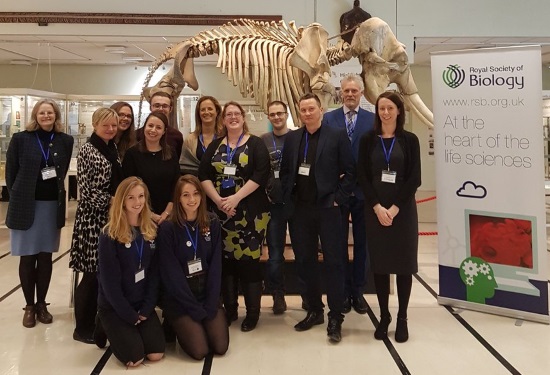
The afternoon was split into two sections; the first half of the afternoon focused on short talks from speakers, while the second consisted of a poster session. The speakers represented various aspects of biology, allowing for good coverage of potential careers.
The speakers all gave excellent 15 minute talks, providing an overview of their interest and graduate entry routes. Most also covered personal advice about how to meet the needs of employers and how to impress them. To prevent information overload, after two short talks, there was a brief break where students typically went to chat to speakers and peruse posters.
Overall, 103 bookings onto the Forum were recorded, with an estimated 60 students attending, including a handful from Oxford. Following the success, we are planning a second run, with improvements following feedback from this first event.
To offer to speak or request information on the 2018 event, please email Jenny: j.atkins@pgr.reading.ac.uk
Dr Kerry Broom CBiol FRSB
Report from Hannah Goldwag, attendee and student affiliate member
Whether your path as a young biologist has already begun or if you undecided about your future goals, the Young Biologists Forum at Reading University was an informative and eye-opening event. Attendees ranged from secondary school students to post-graduate students. I found it particularly interesting to talk to post-graduate students about their PhD research – this alone helped me envisage the variety of routes that my own education, career and research could take.
Previously, when I have considered different careers in biology, roles like a medical writer (with Porterhouse Medical) or a clinical research assistant (for Premier research) had never crossed my mind – mostly because I didn't know such roles existed!
I also didn't know that such roles could be undertaken as internships available for graduates, or how useful biology is in industry and the public sector, for example in the study of water quality as Nick Hill from Water Quality London demonstrated.
When the talks were not taking place, there was the opportunity to talk directly to the representatives from the different organisations. This meant that any questions raised throughout the forum could be discussed in depth which provided a more enriching experience. I felt that advice given was tailored to suit the attendees' current qualifications and aspirations.
I think it is very important to inform young people of all the career opportunities open to them in an appealing way so that they can make informed decisions about their lives. This was fulfilled by the Young Biologists Forum.
I look forward to attending again and hope to see a wider range of organisations represented at future events.
AGM at Wellington College
14 October 2015
The branch Annual General Meeting was hosted by Wellington College, Crowthorne. Members, their guests, teachers and students enjoyed pre-meeting drinks and a buffet generously provided by the Biology Department. We enjoyed an informal net-working opportunity along with our guest speaker, Mr Vaughan Tanner (below left), senior ophthalmic surgeon from the Royal Berkshire Hospital Reading.
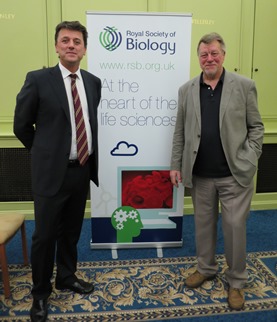
Mr Tanner gave a fascinating talk, along with excellent graphics, showing details of recent surgical advances and techniques in eye surgery. His highly experienced team provides the Vitreo-Retinal surgical service in Berkshire along with a sub-specialist age related macular degeneration service; a micro incision cataract service and general ophthalmic care for acute and routine eye conditions.
The advance of sub-2mm micro-incision cataract extraction with multifocal and toric lens implants was described where this new technique significantly reduces spectacle dependence following cataract surgery.
The lecture covered the development of sutureless small incision vitrectomy techniques for the repair of retinal detachment, macular hole and other vitreoretinal diseases. We also heard how the introduction of many new retinal drug treatments, including Lucentiis and Eylea injections, Ozurdex steroid implants and Jetrea have significantly improved vision for many patients suffering from age related macular degeneration, diabetic retinopathy, retinal vein occlusion and other retinal problems.
Our thanks go to Wellington College and Mr Tanner for the wonderful opportunity to learn more of recent developments in ophthalmology.
Dr John Haspineall CBiol FRSB
Behind the scenes at RHS Wisley
5 May 2015
We were informed that the glasshouses of Wisley gardens are able to withstand winds of more than ninety miles an hour. This was reassuring to the Thames Valley branch visitors on a visit to the Royal Horticultural Society (RHS) in Surrey on a very windy Tuesday in May.
Our guide conducted the group through the tropical, temperate and arid glasshouses. Planting is not organised on a continent basis as it is at Kew, but the plants are mixed to give artistic displays. Specimens can be moved and containers added so that the viewing is always attractive. We enjoyed the tremendous variety and range of size – Wisley offers both the largest waterlily in the world and the smallest, the latter extremely rare and teetering on the brink of extinction.
We learned about the automatic control systems for the glasshouses which regulate temperature, sunlight moisture and wind. In a side room, past the spectacular orchids, we edged round the tanks and machines that supply the glasshouses with water. Some of this is sourced from reservoirs, some from the local river. The water used for the orchids requires removal of mineral salts in order for the plants to be able to absorb nutrients.
After a lunch break and a wander around the gardens we regrouped to learn of the work of the herbarium. The collection of beautifully preserved specimens, some extremely old, others being added as we watched, is fascinating. There is a need to stay one step ahead of the pests poised to 'lunch' on these valuable records of plants. As well as sealing and storing them in dry conditions, each specimen is frozen once a year to kill any successful invaders. The herbarium is in the process of digitising records of their thousands of plants (see plants.jstor.org).
We then moved to the library. At present this is situated in the old building designed in the style of Lutyens and Webb, using reclaimed tiles and beams. Amongst the fascinating collection is a complete series of planting and care notes by George Fergusson Wilson. Wilson was a newly retired industrial chemist who, in 1878, bought 60 acres of farmland at Wisley. He wanted to create a privately owned experimental garden, and chose the site as it has varying microclimates and different soil types all in a small area. He received plants from amateur-plant-hunters from all over the world which he tried in different conditions to see where they flourished.
The visit was hugely enjoyed by the guests who appreciated the time given and enthusiasm of the guides.
Tessa Parkes AMRSB
Drug Development: the Unexpected Role of Plants
15 October 2014
This year, after our AGM at Magdalen College, Oxford, the Thames Valley branch were delighted to host Dr Alison Foster's introductory talk on how plants have been used for drug development. Alison covered a multitude of subjects, introducing the audience to different plots found in the Oxford Botanic Gardens and the different ways in which plants have enabled drug development.
Aside from the direct use of a plant extract, some structures have been inspiration for the development of a novel substance. For example, back before our new technologies, structures were determined and compared by synthesising a structure and physically comparing to the natural form. In some cases, this involved a taste test; clearly before the days of health & safety! In this way, new structures are developed from the natural forms, with novel properties.
In some instances plant products are also used to assist with the formulation of drug substances for example a derivative of castor oil (from the castor oil plant) is used to solubilise paclitaxel, the anti-cancer drug originally found in the pacific yew tree.
Another method by which plants assist in drug research, is using them for 'pharming'. This involves genetic engineering of plants to grow vaccines and produce proteins such as insulin. In doing so, these treatments could potentially be more readily available and accessible and production costs would be greatly reduced.
Alison's fascinating lecture gave the audience tremendous insight into how plants play a pivotal role in past, present and future medicines.
Jenny Atkins AMSB
Greys Court Gardens Visit
14 September 2014
Some 30 members and guests enjoyed a sunny afternoon at Greys Court, a Tudor country house edged by medieval parkland with delightful views over the surrounding countryside near Henley-on-Thames.
We gathered on the lawn in front of the mansion for an introduction to the long history of the estate - which is mentioned in the Domesday Book - by volunteer guide Sue Dickenson. When the last private owners, the late Sir Felix and Lady Elizabeth Brunner, took up residence in 1937, the gardens were virtually derelict but Lady Brunner transformed them into a haven of tranquillity for visitors to share.
Gardener-in-charge Rachel Edwards then led a tour of the gardens, where each self-contained, intimate area of which comes into its own at different times of the year. We progressed through the aptly named White Garden, the still fragrant Rose Garden (which traces the history of the rose) and along the gnarled Wisteria Walk, originally planted in the 1890s.
This led to the extensive walled Kitchen Garden which originated during the Second World War 'Dig for Victory' campaign. It is cultivated organically with companion plantings and many varieties of brightly coloured flowers to enhance pollination by the resident bee population. Apples, pears and vegetables were being harvested for sale at the popular annual Big Harvest Weekend, which regularly attracts some 3,000 visitors.
After a final walk through in the Cherry Garden and an Italianate area, we thanked our hosts warmly for their generosity of time and left with a reminder to return at other times of the year.
Dr John Grainger CBiol FSB
Visit to Lonza Biologics Slough
25 March 2014
Lonza is a worldwide leader supplying the pharmaceutical and biotechnology industries. Lonza's facility in Slough is focused on the manufacture of therapeutic grade monoclonal antibodies and recombinant proteins.
The Society's Joanne Needham began with a short presentation on membership covering the Register scheme. A licence from the Science Council enables the Society to offer Registered Technician, Scientist and Chartered Scientist qualifications. Joanne also covered the requirements for the Society's own Chartered Biologist status, the training courses offered and the Continuous Professional Development (CPD) programme.
Lonza senior scientist Noel Smith described the process of risk assessment of novel products prior to acceptance for development. This involves identifying problems of e.g. toxicity, ability to express the product, ability to purify it and any feature which would prevent its being incorporated into a medicinal product.
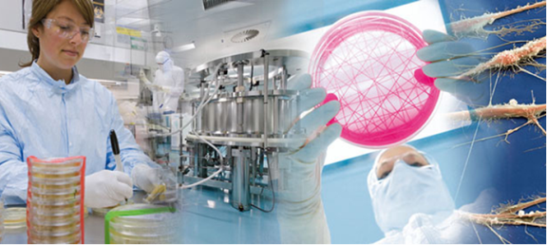
Lead scientist Michael Box covered the development programme once a DNA sequence or transformed cell line expressing the product is accepted by the company. He described the insertion of the vector into the cells, usually CHO cells, selecting the transformed cell lines expressing the highest yield of product, growing up the cells through flask cultures, 10 litre bioreactors, pilot plant scale and production scale. Michael also described the purification techniques, especially for monoclonal antibodies.
As Lonza is involved in production of finished medicinal products, Clare Arnold the section leader described the requirements for current Good Manufacturing Practice (cGMP). She emphasised the need for setting and testing against, specifications of raw materials, intermediate products and finished products, particularly the absence of the bacterial toxin used in the processing. Clare also mentioned other requirements such as contamination control, including clean room requirements and personnel training and conduct.
Visitors were split into groups for a tour of the non-cGMP laboratories. They were taken round the flask culture labs, the 10 litre bioreactor rooms, the pilot plant and the purification and analytical development areas.
This was a most successful meeting and the branch would like to thank all the Lonza staff who gave up their evening to make it possible.
Stephen Lewis CBiol MSB
Orchid walk at The Holies Streatley with Dr Michael Keith Lucas
16 June 2013
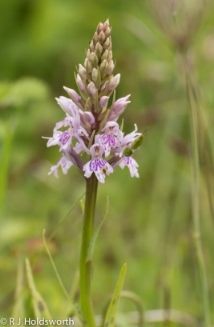
Following forecasts, which initially promised heavy rain for the afternoon, it was good to see a distinct improvement on the day as we gathered in the car park at The Holies. We were given fair warning that, like so many plants this year, the orchids were rather late so there was some uncertainty about how much we would see. However, Michael’s encyclopaedic knowledge of plant species more than made up for that – I for one would not have suspected just how many different varieties of grass grew in the area and how attractive many of them are.
Orchids were limited to the common spotted variety but they were there in numbers. Other distractions included a mating pair of common blue butterflies. The latter part of the walk, through very mature woodland led to some spectacular views over the Thames Valley.
All in all, a very pleasant afternoon and one which, for a number of us, provided an introduction to a particularly attractive area of the countryside and one which I am sure we will revisit.
Roger Holdsworth MSB
Mad cows and mobile phones – whose science is it anyway? Professor Colin Blakemore
16 October 2012
We were very privileged to have Professor Colin Blakemore give a lecture at the Health Protection Agency, Oxfordshire.
Professor Blakemore is an emeritus professor of neuroscience at Oxford but is now based in London at the School of Advanced Study where he is professor of neuroscience and philosophy. Prior to Oxford he was based in Cambridge and he has had held various advisory committee appointments over the years as well as being a Fellow of the Royal Society.
In his lecture Colin discussed how public understanding of science has progressed over the last couple of decades. His first example was the BSE scandal as a failure of risk communication. He described how the scientific uncertainties were insufficiently recognised and the lack of clear evidence of a public risk was taken as no risk. The public interpreted this as a failure of science and this is when the public began to lose interest in science.
He then described the rise of the public understanding movement as communication of science became a duty of scientists themselves, and how various reports to government highlighted this topic. He noted several initiatives like National Science Week and science clubs to encourage science communication.
Professor Blakemore briefly discussed the importance of trust and in whom the public place their trust i.e. doctors and clergy. He mentioned the importance of familiarity and visibility as important factors in trust.
He mentioned the pros and cons of science involvement with the pros including: authority of evidence, revealing the process of science and policing the media. Some of the disadvantages include showmanship, abuse of privilege and conflict with the normal career path.
He gave other examples of media occurrences of scientific issues, such as stem cells, and mobile phones. He also discussed animal research and the impact of public protests.
He concluded his talk by stating that science can be good for society, that there is a positive association with scientific advances and progression especially relating to human health. He noted that there is an increasing positive image of scientists as experts in their fields and that the overall trust of academics is increasing.
All in all, the lecture was extremely interesting and Professor Blakemore engaged the audience with his easy-going manner.


